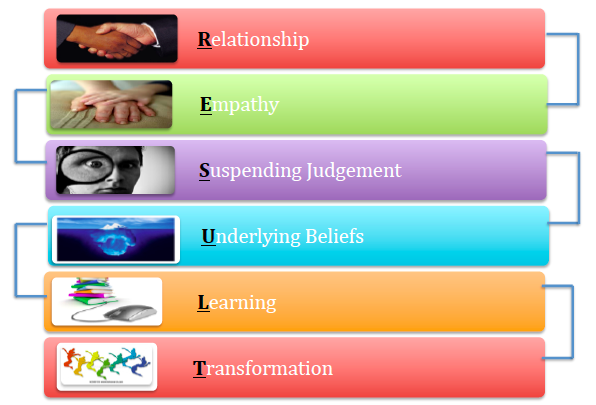A Coaching Model Created by Rajesh Udhoji
(Executive Coach, INDIA)
There is a difference between interest and commitment. When you’re interested in something, you do it only when it’s convenient. When you’re committed to something, you accept no excuses, only results. ~ Ken Blanchard
What is the meaning of Coaching without results?
The coach has to live helping the clients with all possibilities that they can co-create during the course of engagement to achieve the desired RESULT for the Client. Coaching is RESULT focused. This model brings clarity on the elements of the RESULT and how it can be applied in the course of Coaching relationship and engagement.
This Model is applicable in all context of the executive coaching which is aimed at achieving the defined transformation within the organization. The process will provide you with insights into what is important to you and lead you into action.
 The RESULT Process will help you discover your core values, your beliefs, your strengths, motivations, and what you want in your life. This will be done by using tools that are appropriate for your learning style and by the use of following the process to ignite your potential and commitment to bring in the desired transformation.
The RESULT Process will help you discover your core values, your beliefs, your strengths, motivations, and what you want in your life. This will be done by using tools that are appropriate for your learning style and by the use of following the process to ignite your potential and commitment to bring in the desired transformation.
It is a well set principle that your RESULT is an outcome of what your input is through a process of RELATIONSHIP.
Relationship
 Relationship is the foundation on which the Coach and the client work together. This foundation is build on the basis of Trust which needs to be developed between them. It is important that the Coach knows the client sufficiently well and builds RELATIONSHIP which will help the client to open up and the discuss the issues faced with transparently and without any fear or apprehension. This is very critical and belongs to the primary ethical code and competencies defined by ICF.
Relationship is the foundation on which the Coach and the client work together. This foundation is build on the basis of Trust which needs to be developed between them. It is important that the Coach knows the client sufficiently well and builds RELATIONSHIP which will help the client to open up and the discuss the issues faced with transparently and without any fear or apprehension. This is very critical and belongs to the primary ethical code and competencies defined by ICF.
Empathy
 When there is trust and openness, the Coach finds himself or herself in the space of Self-Awareness. It is then possible to be with the client and understand the values and beliefs of the client. In such a situation, you, as a coach, are in a position to see the issues from the client’s perspective and extend help and support to develop insights leading to achieving the desired RESULT for the client.
When there is trust and openness, the Coach finds himself or herself in the space of Self-Awareness. It is then possible to be with the client and understand the values and beliefs of the client. In such a situation, you, as a coach, are in a position to see the issues from the client’s perspective and extend help and support to develop insights leading to achieving the desired RESULT for the client.
Suspending Judgement
 Each interaction has an impact on the parties engaged in the discussion. In our quest for supporting and helping the client, it is possible that the coach gets judgmental and starts looking at the issue from the images about the client created in the mind. We judge people because our self esteem is low. Judging is a form of comparison. We compare ourselves against others. We judge others because we do not like who we are. This is the sad outcome of judgment.
Each interaction has an impact on the parties engaged in the discussion. In our quest for supporting and helping the client, it is possible that the coach gets judgmental and starts looking at the issue from the images about the client created in the mind. We judge people because our self esteem is low. Judging is a form of comparison. We compare ourselves against others. We judge others because we do not like who we are. This is the sad outcome of judgment.